![]()
The UNC TEACCH Program offers early intervention services as well as intervention for school-age children with autism spectrum disorders. Working closely and collaboratively with families has always been central to TEACCH intervention. Our early intervention and school-age sessions involve a collaborative approach between parents, who are the experts in working with their children, and TEACCH clinicians who have expertise in autism. All 7 TEACCH centers offer sessions for toddlers through school-age children using a parent collaborative approach. For more information, contact your local TEACCH Center.

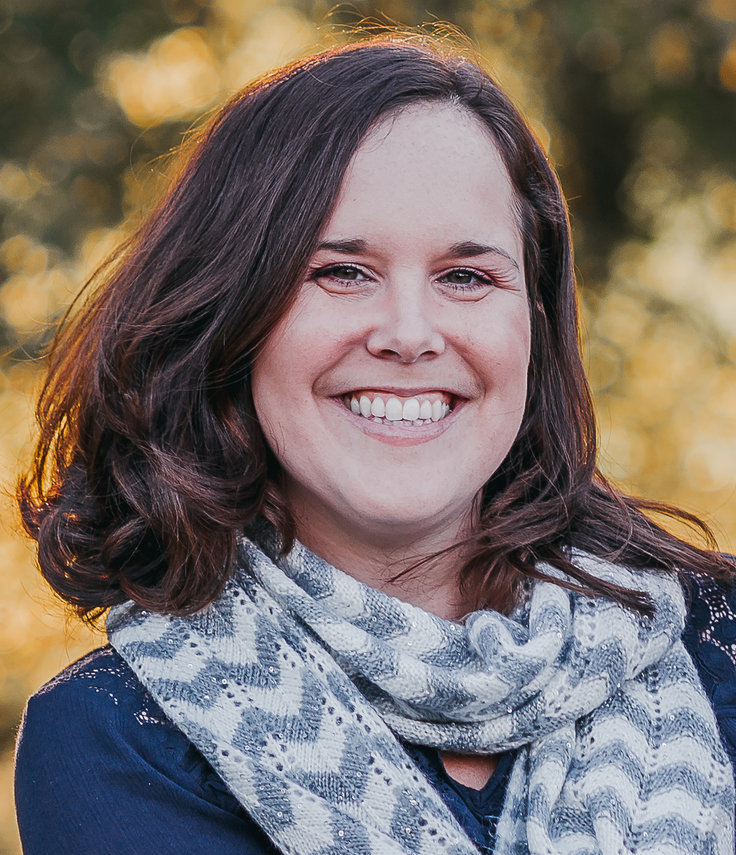 Sara Matherly is a psychologist who recently joined The UNC TEACCH Program – Raleigh Center in September of 2020. She completed her Ph.D. in School Psychology from the University of South Carolina (USC) and then received a joint appointment internship at USC Pediatrics Child Development and Behavioral Health Clinic and Richland Two School District in Columbia, South Carolina. In 2019, Sara was excited to return to her hometown in the Raleigh/ Durham area and TEACCH, having worked with Greensboro TEACCH’s Supported Employment program and completed a postdoctoral fellowship at Chapel Hill TEACCH.
Sara Matherly is a psychologist who recently joined The UNC TEACCH Program – Raleigh Center in September of 2020. She completed her Ph.D. in School Psychology from the University of South Carolina (USC) and then received a joint appointment internship at USC Pediatrics Child Development and Behavioral Health Clinic and Richland Two School District in Columbia, South Carolina. In 2019, Sara was excited to return to her hometown in the Raleigh/ Durham area and TEACCH, having worked with Greensboro TEACCH’s Supported Employment program and completed a postdoctoral fellowship at Chapel Hill TEACCH.
She specializes in diagnosis and intervention for children with autism spectrum disorders. Sara has also worked on research studies monitoring development from infancy into adulthood. She also has specialized training in behavioral approaches to promote development, particularly in early childhood. Sara has joined the TEACCH for Toddlers (TFT) program, blending her knowledge of Structured TEACCHing with naturalistic developmental behavioral intervention strategies. She is also a member of the NC Infant and Young Child Mental Health Collaborative, which works with agencies and stakeholders across the state to improve early detection and intervention services. She has an interest in early childhood as well as supporting families in coordination of care and service delivery across the lifespan and across agencies. When not working, Sara loves spending time with her family, traveling, reading, and going for a walk or run.

There are resources available to help families during this holiday season. We know that this holiday season will be very different from others due to travel precautions and social distancing guidelines. Here are a few resources to help you and your family have a safe and Happy Holiday season:
- TEACCH holiday gift idea list for individuals with ASD
- Duke Autism Center Travel Toolkit
- Innovative Holiday and Winter Gatherings in the Time of COVID-19
- Need Help Paying Bills
- United Way
- NC Food Bank Network
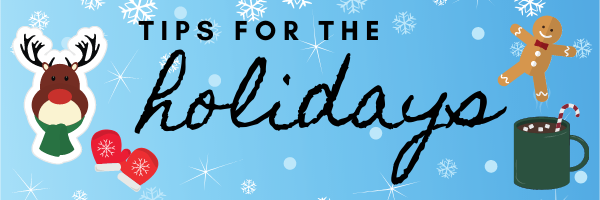
Holidays can be a stressful time for individuals with ASD. Lights, music, and seasonal decorations are magical for some people but may lead individuals with an autism spectrum disorder to experience sensory overload and anxiety.
The key to preparing for the inevitable changes that come with the holidays is to provide the individual with information about an event or activity.
- WHAT will be happening?
- WHEN it will be happening?
- WHO will be involved
- WHERE it will be happening?
Ten Tips to Prepare for the Holidays:
| 1) Use a Calendar
A weekly or monthly calendar can be created to highlight the events throughout the season. The calendar could include when decorations will be put up (or taken down) when family and friends will visit, and or a countdown for when the gifts will be opened. |
 |
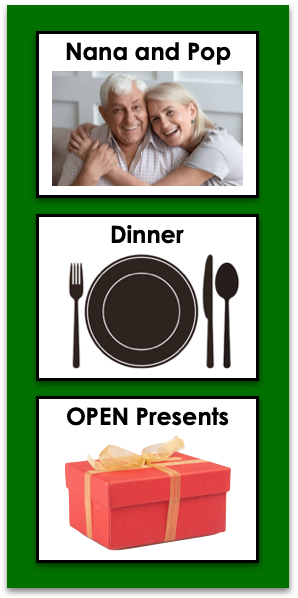 |
2) Visual Schedule Make a daily schedule to help the individual anticipate the activities, places, and people involved. |
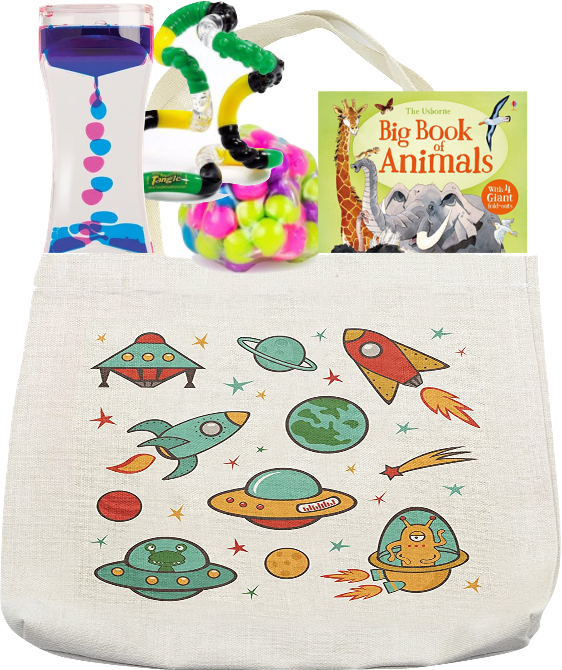 |
3) Supplies
Create a “Mary Poppins” bag to take along when traveling or attending events or holiday celebrations. Pack the individual’s favorite things that will keep him or her entertained. When possible have the individual select the items and help pack the bag. |
| 4) Social Narratives Prepare the individual for upcoming events or changes in routine by writing or drawing a story that describes what will happen. When possible include photos of the activities, places, or the people who will be involved. |
| 5) Quiet Area
Identify a calm area where the individual with autism can go and relax if needed. |
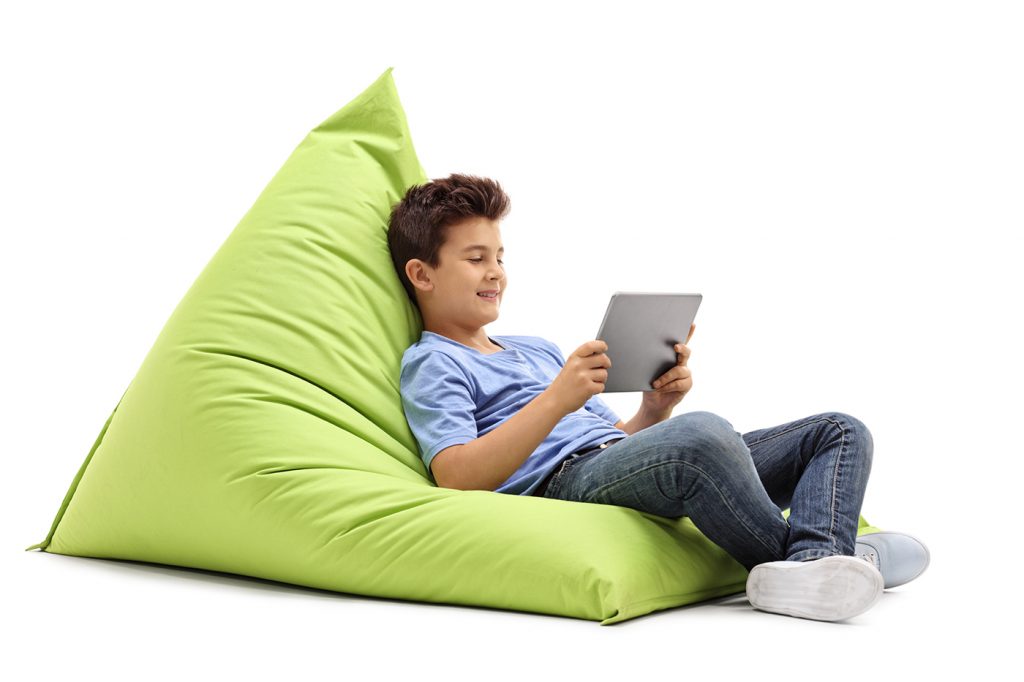 |
6) Routines
Discuss with family how to minimize disruptions to established routines (e.g. bedtime). |
| 7) Timing
Timing can be of the essence. What are your child’s needs for downtime, are there times of day when a public place will be less crowded, how meaningful and fun is an activity to the child, and will it be best to start with that activity or to put it into a first, then routine to help the child through a less preferred activity. |
 |
8) Rehearsal
Practice unwrapping gifts ahead of time, to help the individual with autism understand the process and meaning of gift exchange. |
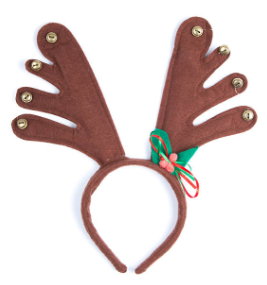 |
9) Visual Supports
When opening gifts, try passing around a visual cue such as a reindeer hat to signal whose turn it is to open the next gift. |
| 10) Gift Preparation
Being surprised is fun for some but causes anxiety for others. Some individuals might need to know what they are opening: a small part of the item can be left visible when wrapped or the individual might be given a list of the presents he or she will receive.
|
 |
Caregiver/Client Corner Blog is brought to you by TEACCH’s Resource and Referral Specialists